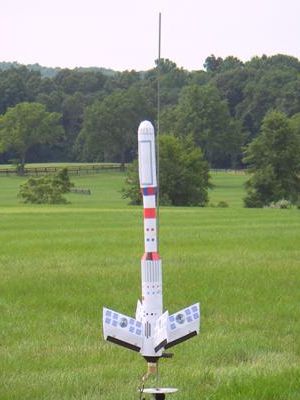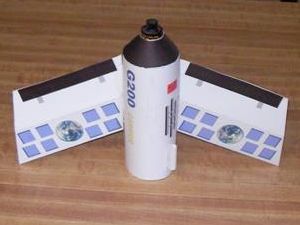| Construction Rating: | starstarstarstarstar_border |
| Flight Rating: | starstarstarstar_borderstar_border |
| Overall Rating: | starstarstarstar_borderstar_border |
| Manufacturer: | Model Minutes  |

Brief:
The G-200 is a large paper rocket that flies on 24mm motors. The diameter of
the lower tube is about 2 3/8" vs the 2" in the specs above the first
review--just a skosh too small to fit the Fat Boy cone that was sitting by my
computer. It features a clear payload section (one of the few non-paper
components) and two build options. The Orbital Launcher option deploys a paper
satellite that comes down on its own chute, while the Payloader option leaves
the payload section open. I chose the latter but built the satellite sans chute
and inserted it in the payload section.
Construction:
This is my second Model Minutes kit and I agree the instructions are improved.
There are regular photos vs the 3D photos that I couldn't see clearly. There
are several minor errors, such as the instructions for building the glasses are
still included but these did not affect the build. There also seem to be some
product improvements since the previous review. I built the entire kit using
Aleene's Tacky Glue.
Step 1 involves building the motor mount, inserting it in the lower body, adding the tail cone and the lower launch lug. This kit uses the same retention method as the XFLR-7 and the previous review has a good photo of the motor mount assembly. The one issue I see is the retainer is sized for D12 motors and will not fit the E9 properly. However, friction fitting and some tape around the motor and retainer tab should do the trick for the longer motor in my estimation. I will find out.
 The four fins are built next. These were formed into diamond airfoils as
described in the earlier review and I had no problems seeing how they went
together. My only problem was that one of the internal braces shifted during
the final assembly (fin 2 of 4), so I made sure the glue set on the brace
before I performed the final folding of the subsequent two. You will see from
my photos that the fins seem to now be mounted further aft than on the version
in the previous review. The instructions mention that you can mix and match
their orientation. I chose all forward-swept since it sounds like the chute may
be a little undersized and this should also protect them from damage. As an
added bonus with the fins forward swept, the tips are even with the end of the
lower body tube, which made their installation much easier.
The four fins are built next. These were formed into diamond airfoils as
described in the earlier review and I had no problems seeing how they went
together. My only problem was that one of the internal braces shifted during
the final assembly (fin 2 of 4), so I made sure the glue set on the brace
before I performed the final folding of the subsequent two. You will see from
my photos that the fins seem to now be mounted further aft than on the version
in the previous review. The instructions mention that you can mix and match
their orientation. I chose all forward-swept since it sounds like the chute may
be a little undersized and this should also protect them from damage. As an
added bonus with the fins forward swept, the tips are even with the end of the
lower body tube, which made their installation much easier.
The rest of the model is pretty much just forming and attaching tubes and transitions. The transitions and the middle tube (the thinner one below the payload) are double walled, which is good for this sized rocket. The double walled tube required a lot of patience to get the inner and outer tabs aligned correctly, and I continued to have fit problems between components (tube-tube, tube-transition, etc). On this build, I took extreme care to cut all the pieces exactly, so I don't know what happened.
I made two deviations near the end of the build: I tied the two provided shock cords together to make one larger one and I only cut one of the panes out of the payload section. Based on the comments in the earlier review, three cutouts just seem to weaken the payload bay too much.
In summary, these are the improvements identified in the instructions:
- Extra reinforcement for the payload bay opening
- Suggested venting of the ejection charge my making a small opening in lower transition
- Two launch lugs
Finishing:
The pre-printed cardstock only requires a couple of coats of clear enamel (or
most any clear coat).
Construction Rating: 4 out of 5
Flight:
As mentioned earlier, The E9 is too long for the provided motor hook. I made a
thin masking tape thrust ring between the motor tube and the motor hook and
then applied several wraps of tape around the hook and overhanging motor. The
wadding was all dog barf, and I used a dowel to work some down into the lowest
reaches of the body tube.
The E9-4 provides a great ride for this rocket. The overall path was straight up and there was just a hint of coning. Ejection was around apogee.
Recovery:
The chute didn't appear to be fully deployed but when recovered I found that it
was open but it was severely twisted and entwined with the shock cord. The
Model Minutes chutes need longer riser lines and a snap swivel. Still, there
was no damage on landing.
When I inspected the rocket, I notice there was some browning of the cardstock on one quadrant between the fins. This may have actually been due to the wadding I worked down above the motor. It seems strong enough to fly again, but I have concerns whether the kit could survive multiple flights on the E9.
Given the flight and damage-free recovery, I would rate the kit a 4.5 for flight/recovery. However, I will deduct a point for the charring.
Flight Rating: 3 out of 5
Summary:
This is a somewhat easier kit than the XFLR-7, but I still had my difficulties.
Up close, there are misalignments but from a distance, it looks OK. I will
blame a lot of this on me. I have since seen another good tip for constructing
paper models: apply all glue with a toothpick. This will help ensure you don't
use too much as I tend to.
The construction is good for this sized paper kit--air foiled fins and double wall components make it a lot sturdier. It flies great on the E9-4 despite it not fitting the motor hook. I noted some browning of the cardstock, which tells me this kit will not be the workhorse of anyone's fleet.
Overall Rating: 3 out of 5
Other Reviews
- Model Minutes G-200 Carrier By Chan Stevens
This is a monster of a paper rocket, capable of handling 24mm motors and carrying payloads. Paper rockets in general are always a nice break from the routine and this one is certainly a break from the paper rocket norm. I had the pleasure of building a beta version of this as well as the final version. This review is based on the final version. The parts list for this Model Minutes kits is ...
 |
 |
Flights
Sponsored Ads
 |
 |











